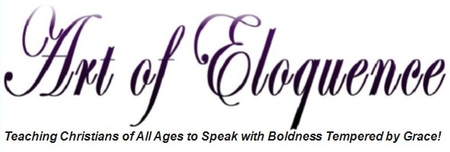 There are communication lessons for us in just about every area of life. That's because communication affects every aspect of our lives from birth to death and from relationships to business and ministry.
I'm starting a new segment on the Art of Eloquence blog each month called, Communication Lessons from Fairy Tales and this month I start with the most obvious:
Lessons from "The Boy Who Cried Wolf"
Everyone knows the story. A boy cries wolf so often people no longer respond to his pleas and then, when a real wolf threatens him, nobody believes him enough to help when he really needs it. We see this played out differently in the technological age where car alarms go off day and night and nobody responds because ten or twenty years ago everyone's after market alarm was going off just because a bear roared in the woods.
The danger in crying wolf:
Most of us live in the city so we don't cry wolf, but we do over dramatize things in order to manipulate people to give us what we want. Wives do it with their husbands. Friends do it to other friends and there have been some documented cases of Facebook users have been cried poverty asking for donations to their cause!
The dangers of this are obvious so I won't go into detail here except to tell you to make sure you check your drama at the door before you use it. It can backfire on you.
The danger in THINKING someone is crying wolf:
Because there are so many scams out there and because people do exaggerate these days, there is also a danger in appearing as if you are over dramatizing something when you aren't. Sally has Lupus. Milly has Fibro. These are chronic illnesses which give their victims good and bad days. When Sally or Milly talk about their challenges for years, there is a danger that their friends will disregard their needs or feelings because they're tired of hearing it. This leaves Sally and Milly without a support which makes their illness that much more debilitating.
The danger in crying wolf with your words:
Exaggeration is very common these days. Mary says, "I'm EXHAUSTED!" What she really means is she's tired. Fred says, I'm STARVING!" What he really means is he's hungry.
These inflated words are bantered around so often that when people who really are exhausted or starving say it, it doesn't mean much to us anymore.
Be careful of the words you use and the drama you put into your communication. Be careful, also, to look closely at other people when they seem overly dramatic. They may not be crying wolf and need your understanding and support.
There are communication lessons for us in just about every area of life. That's because communication affects every aspect of our lives from birth to death and from relationships to business and ministry.
I'm starting a new segment on the Art of Eloquence blog each month called, Communication Lessons from Fairy Tales and this month I start with the most obvious:
Lessons from "The Boy Who Cried Wolf"
Everyone knows the story. A boy cries wolf so often people no longer respond to his pleas and then, when a real wolf threatens him, nobody believes him enough to help when he really needs it. We see this played out differently in the technological age where car alarms go off day and night and nobody responds because ten or twenty years ago everyone's after market alarm was going off just because a bear roared in the woods.
The danger in crying wolf:
Most of us live in the city so we don't cry wolf, but we do over dramatize things in order to manipulate people to give us what we want. Wives do it with their husbands. Friends do it to other friends and there have been some documented cases of Facebook users have been cried poverty asking for donations to their cause!
The dangers of this are obvious so I won't go into detail here except to tell you to make sure you check your drama at the door before you use it. It can backfire on you.
The danger in THINKING someone is crying wolf:
Because there are so many scams out there and because people do exaggerate these days, there is also a danger in appearing as if you are over dramatizing something when you aren't. Sally has Lupus. Milly has Fibro. These are chronic illnesses which give their victims good and bad days. When Sally or Milly talk about their challenges for years, there is a danger that their friends will disregard their needs or feelings because they're tired of hearing it. This leaves Sally and Milly without a support which makes their illness that much more debilitating.
The danger in crying wolf with your words:
Exaggeration is very common these days. Mary says, "I'm EXHAUSTED!" What she really means is she's tired. Fred says, I'm STARVING!" What he really means is he's hungry.
These inflated words are bantered around so often that when people who really are exhausted or starving say it, it doesn't mean much to us anymore.
Be careful of the words you use and the drama you put into your communication. Be careful, also, to look closely at other people when they seem overly dramatic. They may not be crying wolf and need your understanding and support.
Communication Lessons from Fairy Tales
 There are communication lessons for us in just about every area of life. That's because communication affects every aspect of our lives from birth to death and from relationships to business and ministry.
I'm starting a new segment on the Art of Eloquence blog each month called, Communication Lessons from Fairy Tales and this month I start with the most obvious:
Lessons from "The Boy Who Cried Wolf"
Everyone knows the story. A boy cries wolf so often people no longer respond to his pleas and then, when a real wolf threatens him, nobody believes him enough to help when he really needs it. We see this played out differently in the technological age where car alarms go off day and night and nobody responds because ten or twenty years ago everyone's after market alarm was going off just because a bear roared in the woods.
The danger in crying wolf:
Most of us live in the city so we don't cry wolf, but we do over dramatize things in order to manipulate people to give us what we want. Wives do it with their husbands. Friends do it to other friends and there have been some documented cases of Facebook users have been cried poverty asking for donations to their cause!
The dangers of this are obvious so I won't go into detail here except to tell you to make sure you check your drama at the door before you use it. It can backfire on you.
The danger in THINKING someone is crying wolf:
Because there are so many scams out there and because people do exaggerate these days, there is also a danger in appearing as if you are over dramatizing something when you aren't. Sally has Lupus. Milly has Fibro. These are chronic illnesses which give their victims good and bad days. When Sally or Milly talk about their challenges for years, there is a danger that their friends will disregard their needs or feelings because they're tired of hearing it. This leaves Sally and Milly without a support which makes their illness that much more debilitating.
The danger in crying wolf with your words:
Exaggeration is very common these days. Mary says, "I'm EXHAUSTED!" What she really means is she's tired. Fred says, I'm STARVING!" What he really means is he's hungry.
These inflated words are bantered around so often that when people who really are exhausted or starving say it, it doesn't mean much to us anymore.
Be careful of the words you use and the drama you put into your communication. Be careful, also, to look closely at other people when they seem overly dramatic. They may not be crying wolf and need your understanding and support.
There are communication lessons for us in just about every area of life. That's because communication affects every aspect of our lives from birth to death and from relationships to business and ministry.
I'm starting a new segment on the Art of Eloquence blog each month called, Communication Lessons from Fairy Tales and this month I start with the most obvious:
Lessons from "The Boy Who Cried Wolf"
Everyone knows the story. A boy cries wolf so often people no longer respond to his pleas and then, when a real wolf threatens him, nobody believes him enough to help when he really needs it. We see this played out differently in the technological age where car alarms go off day and night and nobody responds because ten or twenty years ago everyone's after market alarm was going off just because a bear roared in the woods.
The danger in crying wolf:
Most of us live in the city so we don't cry wolf, but we do over dramatize things in order to manipulate people to give us what we want. Wives do it with their husbands. Friends do it to other friends and there have been some documented cases of Facebook users have been cried poverty asking for donations to their cause!
The dangers of this are obvious so I won't go into detail here except to tell you to make sure you check your drama at the door before you use it. It can backfire on you.
The danger in THINKING someone is crying wolf:
Because there are so many scams out there and because people do exaggerate these days, there is also a danger in appearing as if you are over dramatizing something when you aren't. Sally has Lupus. Milly has Fibro. These are chronic illnesses which give their victims good and bad days. When Sally or Milly talk about their challenges for years, there is a danger that their friends will disregard their needs or feelings because they're tired of hearing it. This leaves Sally and Milly without a support which makes their illness that much more debilitating.
The danger in crying wolf with your words:
Exaggeration is very common these days. Mary says, "I'm EXHAUSTED!" What she really means is she's tired. Fred says, I'm STARVING!" What he really means is he's hungry.
These inflated words are bantered around so often that when people who really are exhausted or starving say it, it doesn't mean much to us anymore.
Be careful of the words you use and the drama you put into your communication. Be careful, also, to look closely at other people when they seem overly dramatic. They may not be crying wolf and need your understanding and support.
3 comments
-
I agree that crying wolf can lead to a world of problems. However, I think a lot of people do it on social media sites like Facebook to get attention. Plus, people are much bolder online than they would ever be to your face.
In my life, one of the problems with crying wolf comes with a hypochondriac child. Most of the time, there is nothing wrong. But there were a few times when there was something seriously wrong. You have to learn to cut through, but I tended to overreact and paid a lot for doctor visits that maybe weren’t needed, but it’s a really hard call when a child’s involved.
-
I have to agree with you there. You never want to take a chance with your child.
-
[…] touched on this briefly in my post a couple weeks ago, Communication Lessons from Fairy Tales, but here is a more in depth look at this […]
